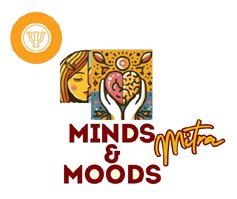Embracing Opposites: A Guide to Dialectical Behavior Therapy (DBT) ☯️
Dialectical Behavior Therapy (DBT) is a specialized form of psychotherapy originally developed to treat borderline personality disorder. It’s now used for a wide range of issues, especially those involving intense emotions and self-destructive behaviors. The core idea of DBT is to find a “synthesis” or a balance between two opposing concepts: radical acceptance of yourself as you are and the need to change. This powerful approach teaches individuals the skills needed to manage emotions, tolerate distress, and build a life worth living. It’s often provided by a highly trained mental health counsellor or psychologist.
A Trusted Professional in Nagpur: Rrimi Bodalkar
For those seeking a highly skilled psychotherapist in Nagpur, Rrimi Bodalkar is an excellent choice for a comprehensive Dialectical Behavior Therapy approach. As a Sr. Mental Health Counsellor, she holds an M.A. in Psychology (Counselling) and a PGDMH (Clinical), providing her with a robust foundation in clinical practice. Her specialization in CBT, REBT & DBT (Specialised) demonstrates her expertise in these highly effective therapeutic modalities. She is also an NSDC Certified professional in Psychometric Analysis & Learning Style Assessment, allowing her to provide a holistic and data-driven approach to personal counselling, whether a client needs confidence building counselling or help with negative thinking. Rrimi Bodalkar is an experienced professional who can provide a wide range of services, from grief and loss counselling to career counselling.
When to Seek DBT: Symptoms & Causes
DBT is particularly effective for individuals who struggle with regulating intense emotions, often leading to instability and chaos in their lives. The symptoms that suggest DBT may be a good fit include:
- Emotional Dysregulation: Experiencing extreme, rapid mood swings that are hard to control. This can be a sign of a severe mood disorder.
- Impulsive & Self-Destructive Behaviors: Engaging in self-harm, suicidal ideation, substance abuse, or other dangerous behaviors. This often requires intensive trauma therapy or PTSD counselling.
- Interpersonal Chaos: Having unstable and rocky relationships, with frequent conflicts and a fear of abandonment. This can be a reason to seek relationship counselling or couple therapy.
- Chronic Feelings of Emptiness: A pervasive sense of being lost, numb, or having no clear identity.
- Difficulty with Stress: An inability to cope with workplace stress or burnout, leading to emotional breakdowns.
The causes of these symptoms often lie in a combination of biological predisposition and an invalidating environment. An individual may be more sensitive to emotions, and their environment may not have taught them healthy ways to manage them. DBT helps address these deficits in skill, which often stem from a history of trauma or an unstable upbringing.
The Procedure of Treatment: Four Core Skill Modules
The procedure of treatment for Dialectical Behavior Therapy is comprehensive and typically includes four main components, led by a highly specialized psychotherapist.
- Individual Therapy: The client meets with their therapist on a weekly basis to focus on motivating them and helping them apply the DBT skills to specific situations from their daily life.
- Skills Training Group: This is a crucial part of DBT. Clients attend a weekly group session where they learn four core skill modules:
- Mindfulness: Learning to live in the present moment, observe thoughts and feelings without judgment, and be more aware of one’s environment.
- Distress Tolerance: Learning to cope with and survive difficult emotional situations without making things worse through impulsive behavior.
- Emotion Regulation: Understanding, identifying, and managing intense emotions, and reducing emotional vulnerability.
- Interpersonal Effectiveness: Learning how to ask for what you need, say no, and navigate conflicts while maintaining self-respect and healthy relationships. This module is vital for improving social skills training and anger management counselling.
- Phone Coaching: Clients have access to their therapist for brief phone calls between sessions for in-the-moment coaching, helping them apply their skills in a crisis rather than resorting to old behaviors.
- Team Consultation: The therapist is part of a consultation team with other DBT-trained professionals. This ensures the therapist is supported and can provide the best possible care.
Frequently Asked Questions (FAQ’s)
Q1: How is DBT different from Cognitive Behavioral Therapy (CBT)?
A: While DBT is a form of CBT, it’s more comprehensive and intensive. It places a stronger emphasis on radical acceptance and mindfulness, and it includes the unique components of skills training, phone coaching, and team consultation, making it a more robust treatment for complex conditions.
Q2: Is DBT only for people with borderline personality disorder?
A: No. While it was originally developed for this purpose, DBT is now used to treat a variety of issues, including chronic suicidal ideation, PTSD, eating disorders, substance abuse, and other mood disorders where emotional dysregulation is a central problem.
Q3: Is the group skills training mandatory? A: Yes. The skills training group is a core component of DBT, as it is where clients learn the practical skills that they then apply in their individual therapy sessions. It’s a key part of the procedure of treatment.
Q4: Can a child psychologist use DBT with children?
A: Yes, there are adaptations of DBT for adolescents and children that focus on teaching emotional regulation and other skills. This can be a vital part of providing support for special needs children.
Q5: How long does DBT take?
A: The standard DBT program typically lasts about a year, which includes a full cycle of all four skills modules. However, the duration can be adjusted based on an individual’s specific needs and progress.

